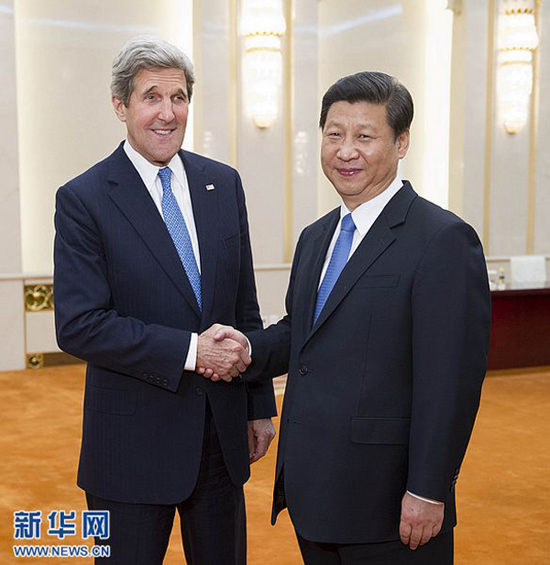China, US trying to forge a new kind of relationship
- By Zhao Jinglun
 0 Comment(s)
0 Comment(s) Print
Print E-mail China.org.cn, April 15, 2013
E-mail China.org.cn, April 15, 2013
|
|
|
Chinese President Xi Jinping meets with visiting U.S. Secretary of State John Kerry in Beijing, China, April 13, 2013. [Xinhua] |
History tells that war is inevitable when a rising power challenges an established power. We saw rising Germany challenge Britain in World War I. Before that, there was the Russo-Japanese war of 1904; after that we had the Cold War. Such patterns seem to have been recognized by historians since Thucydides.
But such historical patterns no longer hold, because China’s rise is peaceful and does not challenge established U.S. power. As President Xi Jinping told visiting U.S. Secretary of State John Kerry, “There is enough space between the coasts of the Pacific Ocean for both the U.S. and China.”
Discussing bilateral ties, Xi told Kerry: “Both nations should respect each other’s core interests and choice of development path.” He said that, in his telephone conversation with President Barack Obama on March 15; they had agreed to handle bilateral relations with a strategic and long-term view, actively engage in dialogue and cooperation, settle their differences in a spirit of mutual respect and seek common ground while putting aside differences.
That China and the United States can build a new breed of relationship is recognized clearly by former Secretary of State Hillary R. Clinton. In her Forrestal Lecture delivered a year ago at the U.S. Naval Academy, she said: “Today’s China is not the Soviet Union. We are not on the brink of a new Cold War in Asia.” She mentioned expanding trade, connections between the two peoples, and ongoing consultation between the two governments as evidence of strong bilateral support. Relations are mutually beneficial and not a zero-sum game. “A thriving China is good for America and a thriving America is good to China.” Well said.
In dealing with the current Korean crisis, the two sides see eye-to-eye that the Korean Peninsula must be nuclear free, peaceful and stable, and that the dispute must be settled through dialogue and negotiation, preferably through six-party talks.
China is unhappy about U.S. deployment of B-2 stealth bombers, B-52 strategic bombers and missile defense system so close to China’s door step. As Kerry sought China’s help in defusing Korea tensions, he acknowledged that recent American steps to beef up its defenses against North Korea were causing discomfort in China. He said that if the North Korean threat disappears, it would not be necessary for the U.S. to “have that kind of robust, forward-leaning posture of defense.” He added that it would be America’s hope “in the long run, or better yet in the short run, that we can address that.” Really?
To forge a new-type big power relationship, it obviously requires a degree of strategic mutual trust.
Has Washington renounced its global strategic goal of suppressing any rising power in Europe or Asia that can challenge its supremacy? It has always unabashedly claimed world leadership. In her Forrestal Lecture, Hillary declared “our global leadership is not a birthright. It has been earned by each successive generation….” But how? Through endless wars? It would be naïve to expect imperial America to really change its color.
But Obama’s second term does look a bit more pragmatic. When it began, the president declared “wars are ending.” Has Washington learned a lesson from its failures in Iraq and Afghanistan? Constrained by sequestration, it has to shrink its war fighting machine just a little bit. There are hints that in U.S. rebalance to the Asia Pacific region, it may deemphasize the military in favor of the economy. But its Trans Pacific Partnership looks foolhardy as it explicitly excludes the most dynamic economic power – China.
To build a genuinely new breed of relationship, both sides need to be more realistic.
The author is a columnist with China.org.cn. For more information please visit:
http://china.org.cn/opinion/zhaojinglun.htm
Opinion articles reflect the views of their authors, not necessarily those of China.org.cn.







Go to Forum >>0 Comment(s)